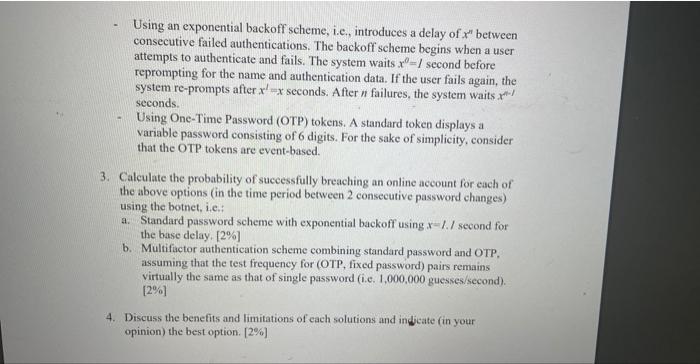Answered step by step
Verified Expert Solution
Question
1 Approved Answer
i want solution with out code - Using an exponential backoff scheme, i.e., introduces a delay of xn between consecutive failed authentications. The backoff scheme
i want solution with out code 
- Using an exponential backoff scheme, i.e., introduces a delay of xn between consecutive failed authentications. The backoff scheme begins when a user attempts to authenticate and fails. The system waits x0=I second before reprompting for the name and authentication data. If the user fails again, the system re-prompts after x=x seconds. After n failures, the system waits xn1 seconds. - Using One-Time Password (OTP) tokens. A standard token displays a variable password consisting of 6 digits. For the sake of simplicity, consider that the OTP tokens are event-based. 3. Calculate the probability of successfully breaching an online account for each of the above options (in the time period between 2 consecutive password changes) using the botnet, i.e.: a. Standard password scheme with exponential backoff using x=1.1 second for the base delay. [2\%] b. Multifuctor authentication scheme combining standard password and OTP. assuming that the test frequency for (OTP, fixed password) pairs remains virtually the same as that of single password (i.e. 1,000,000 guesses/second). [2%] 4. Discuss the benefits and limitations of each solutions and indicate (in your opinion) the best option. [2\%] 
Step by Step Solution
There are 3 Steps involved in it
Step: 1

Get Instant Access to Expert-Tailored Solutions
See step-by-step solutions with expert insights and AI powered tools for academic success
Step: 2

Step: 3

Ace Your Homework with AI
Get the answers you need in no time with our AI-driven, step-by-step assistance
Get Started


